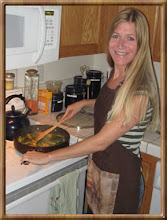 I have been composting for so many years that it has become second nature to view almost any food scrap as future "Black Gold." This commodity is so desirable to gardeners and farmers alike that there have been numerous events held in its honor. Yes, even taste testing contests are held for the finer aficionados of this delectable dirt.
I have been composting for so many years that it has become second nature to view almost any food scrap as future "Black Gold." This commodity is so desirable to gardeners and farmers alike that there have been numerous events held in its honor. Yes, even taste testing contests are held for the finer aficionados of this delectable dirt.When I use the term Black Gold, I am simply referring to high quality, well composted, nutrient rich soil, which is created via the decomposition of earthly foods and natural vegetation. So, it is somewhat disheartening when I view somebody throwing perfectly biodegradable food into the garbage can--which is directly headed for the landfill.
It should be well known by now that, "If the 21.5 million tons of food residuals generated annually were composted instead of being sent to landfills, the resulting reduction in greenhouse gas emissions would be equivalent to taking more than two million cars off the road." –Resource Recycling, Elizabeth Cotsworth, “Composting opportunities improve food waste management,” Nov. 2000
Since we, as a society, are already burdened with the task of ridding ourselves of an ever growing, humungous heap of trash--it seems obvious that the last thing we would want to add to the pile would be easily compostable items such as food scraps.
Here in Sonoma County, we are fortunate as the Sonoma Dump runs Recycle Town as well as an active composting program which produces fresh, organic compost for the public at large to utilize. However, since only the materials that are in your yard waste bin are used in creating the compost, there is still plenty of food that lands in the gigantic trash heap. Therefore, if the citizens of our community all composted at home, we could make an even greater impact in reducing the amount of trash products we are sending to the dump.
How would this work? Well in my eyes, citizens could either learn to create a small compost station for their home or simply compost their veggies by putting them in the yard waste bin to be picked up curbside. This type of composting is actually encouraged by The Sonoma Waste Management System, as they state that approximately 35% of all resiential garbage is food waste.
Unfortunately, when I speak to others about composting, there often appears to be some type of intimidation or disgust around the breakdown of rotting foods and the earthworms wriggling through this topic. However, earthworms are supremely beneficial and creating compost is not as difficult as one may think. Sure, there are scientifically proven ways to get the perfect heated temperature causing the quick breakdown of food stuffs and the killing off of bad microorganisms, but in all actuality, for most home use purposes composting can be quite a simple process.
For example, in dealing with the leftover foodscraps in our home, we have a small, lidded step can, which has a bucket inside that we keep in our kitchen. When the bucket gets full, we transfer it outside to our compost pile. Since our garden space is relatively small, the compost pile is in a vertical fashion. Food stuffs and leaves go in at the top and by the time they reach the bottom (over a period of many months) they are miraculously converted into the sacred Black Gold.
Since composting only takes a relatively small change in our "trash related" behaviors, I have often wondered why there are not composting containers sitting right along side of the recycling bins and garbage cans located throughout our cities. However, one day as I was listening to a talk radio show, I learned that Berkeley is indeed actually implementing such a program. The beauty of this plan is that so much great compost is generated, the city shares much of it with organic farmers in the surrounding areas--which is a beneficial process for everyone involved.
So, it seems to me that since we already have a wonderful composting program in place at our very own Sonoma Dump, taking this one step further to emulate Berkeley's program would be somewhat of a straightforward task---but first the intrinsic worth and supreme coolness of Black Gold needs to rise up the scale of importance like fair trade products, organic food and sustainable living.




1 comment:
Thanks for all this great info, Lisa. I had no idea the rules had changed with regard to putting food waste in the yard waste cart. That used to be a no-no! So I'll at least start doing that much. I'd like to start composting again, too. Our kitchen is so incredibly small, I just have no idea where to collect the scraps. Will have to figure something out.
Post a Comment